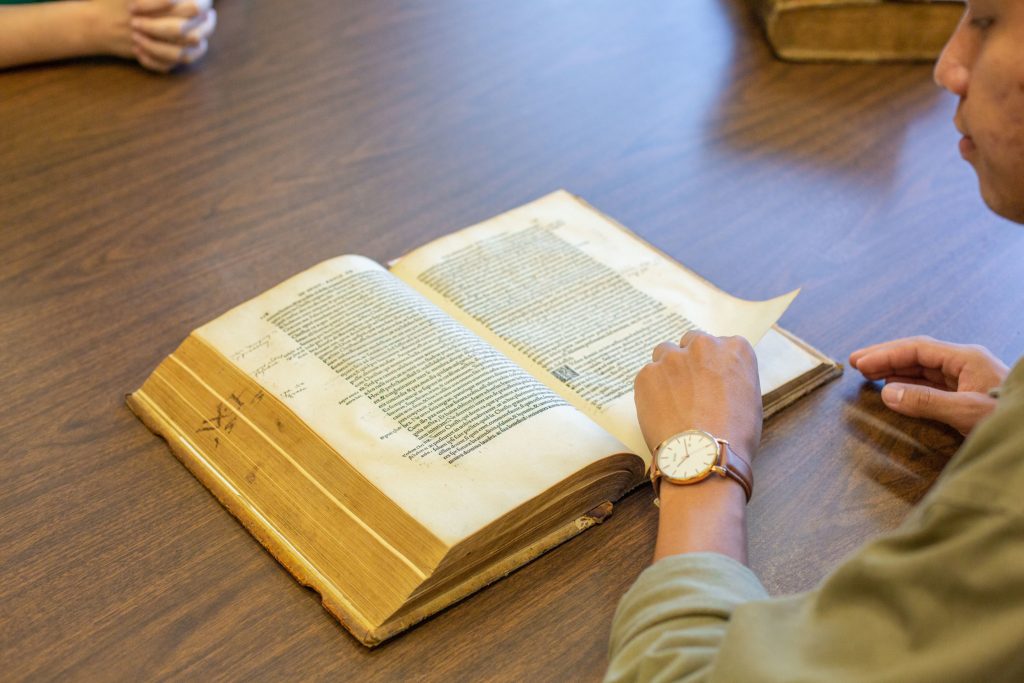
When Dale Schrag reached his $1 million fundraising goal for an endowment for the Mennonite Library and Archives (MLA) at Bethel College, he was ready to celebrate with donors and friends.
Just one problem – the goal completion came in the spring of 2020, when the pandemic was almost literally shutting the world down.
After 2½ years, Schrag says, he wondered if he should just give up the idea of an event. But a friend with fundraising experience told him, “You have to do something – you can’t meet a major fundraising goal like that without a celebration.”
So Schrag, a retired librarian and church relations director and lifelong historian, and Mary Sprunger, professor of history at Eastern Mennonite University, are inviting the Mennonite academic world to a party in honor of Desiderius Erasmus, “the intellectual rockstar of 16th-century Europe,” as Sprunger calls him.
The symposium, titled “Old Books Made New: The Surprising Wisdom of Erasmus for Today,” will be held simultaneously on the Bethel, Conrad Grebel University College, EMU and Goshen College campuses Nov. 4-5, linked via livestream and Zoom.
Erasmus Symposium Schedule @ EMU
Learn more about the free symposium and presenters.
At EMU, the symposium will be held in Room 303 of the Sadie Hartzler Library. All times are EDT.
No registration is required and all are welcome.
Friday, Nov. 4:
- 7:30-9 p.m. “Erasmus for our Age,” Keynote address by Dr. Greta Kroeker
Saturday, Nov. 5:
- 9:30-10 a.m. Rare book show and tell.
- 10 a.m.-12:15 p.m.Student presentations on specific Erasmus library holdings.
- 1:15-2:15 p.m. Roundtable 1: The Contemporary Relevance of Erasmus
- 2:15-3 p.m. Roundtable 2: The Future of Rare Book Libraries in a Digital Age
The symposium is sponsored by the Marpeck Deans’ Fund, set up by the late Robert and Gerald Kreider to foster inter-Mennonite academic collaboration. There are nine college and seminary members in the United States and Canada.

Other fiscal sponsors are Anabaptist Mennonite Biblical Seminary, Elkhart, Ind., Bethel, EMU and Goshen College, which all have Erasmian texts in their libraries, along with Conrad Grebel in Waterloo, Ontario, and a private Kansas foundation, the BISON Foundation. Bluffton (Ohio) University and Canadian Mennonite University, Winnipeg, will be participating in parts of the symposium.
Schrag will host a private dinner for donors to the MLA endowment in conjunction with the symposium.
Schrag is well known as an enthusiastic Erasmus scholar. Erasmus is particularly interesting to Reformation and Mennonite scholars because of his influence on Martin Luther and early Anabaptist leaders.
At a program Schrag did about Erasmus in 2017, he met John Byler from Hesston, Kan.
“He was very interested in Erasmus,” Schrag recalls, “which was unusual for a youngish guy. He had done a master’s thesis [on Erasmus] at Northwestern.”
Byler told Schrag in an e-mail: “We need to do a symposium on Erasmus, because our world needs Erasmus like never before.”
So the seed of an “Erasmus symposium” as a way of honoring the MLA and other libraries had been planted. With the idea of making it intercollegiate, Schrag began working with Sprunger on the planning.
As Schrag was contemplating what to build a symposium around, he thought about the oldest book in the MLA’s collection – Erasmus’s 1522 translation of the New Testament.
“We looked to see which Mennonite institutions had 16th-century Erasmian publications,” Schrag says. “Goshen has two, Bethel and AMBS have one each, and EMU has more than a dozen.”
Schrag also knew immediately who he wanted for a keynote speaker: Bethel graduate Greta Kroeker, Ph.D., an Erasmus scholar and a professor at the University of Waterloo.
Schrag imagined Kroeker would want to give her keynote lecture virtually, but she insisted on coming to campus in person.
Kroeker will open the symposium with her address, “Erasmus for Our Age,” on the Bethel campus, with livestreaming to audiences at other sites, including EMU> to audiences at Conrad Grebel, EMU and Goshen.
Saturday’s activities will take place at all four locations, linked via Zoom.
“Erasmus embraced the innovative technology of his day: the printing press,” Sprunger notes. “In that spirit, we are using our newest technologies to connect presenters, audiences and the rare books themselves across thousands of miles.”
Activities start with a show-and-tell of each institution’s Erasmus books. There will also be a virtual exhibit on the symposium website.
There will be student research presentations on specific library holdings, and two roundtable discussions, one with faculty members and Kroeker on the contemporary relevance of Erasmus, and one a conversation among librarians about the value of rare books and the future of books.
The symposium wraps up around 3 p.m. “Then it will be done,” Schrag says, “and there will be Erasmus disciples multiplying apace.”
